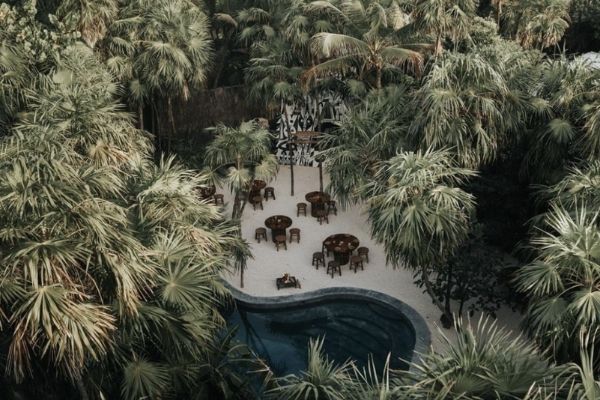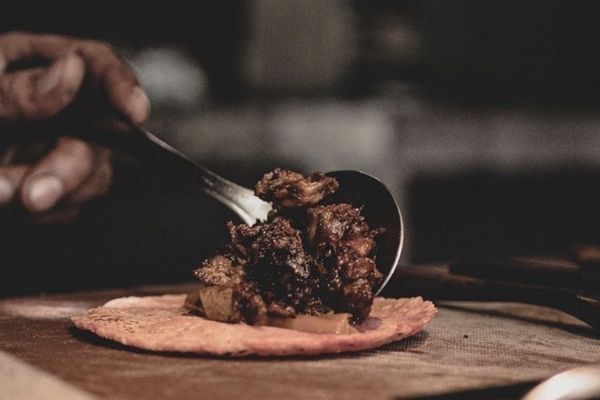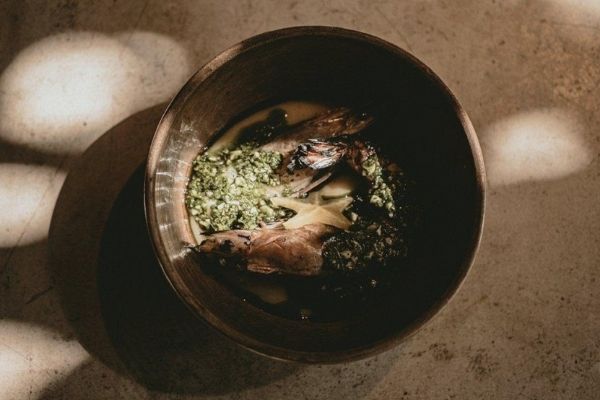The Tree House is a cultural symbol of Tulum’s once-sleepy village during rapid transformation, situated between tropical rainforest and the Caribbean coastline on Tulum’s vibrant, hectic Beach Road. Like the Medina in Marrakesh or South Beach in the 1980s, Tulum is a site of chaos, promise, and potential. At its creative core is the Tree House, where weekly discussions, musical performances, craft workshops, ecological seminars, and artists residencies draw inspiration from Yucatán’s rich culture and generate a lively conversation about Tulum’s future.
Tulum TreeHouse has five guest rooms, an open-air restaurant, a working studio with an outdoor ceramics kiln, and a shop by Xinu, a Mexican botanical fragrance, and was designed by COLAB Design Office with interior curation by Annabell Kutucu. A huge 20-person rooftop dining table looks out over incredible vistas of the limitless forest through windows that open to outdoor dining areas. Our designers come from various backgrounds, but they are all committed to using local, organic, and sustainable materials whenever possible to create a unique and welcome collaboration workplace.
Key Highlights
- Tulum Tree House is a hybrid guesthouse centered on an open-air kitchen that enables the communication between artisans, chefs, farmers, artists, and designers to maintain and develop Mexican craft traditions.
- Each room is designed around the natural surroundings and is influenced by the works of Luis Barragán. Throughout the day, framed vistas via handmade surfaces generate fresh compositions, reviving authentic connections with the natural world.”
- The Tulum TreeHouse Kitchen celebrates Mexico’s natural richness as well as the diversity of its regional cuisine. Seasonal meals are prepared over an open fire made entirely of wood.
- Residents are welcomed to explore new cultural conversations and opportunities for the value of cultural knowledge.
- Mestiza de Indias, a tropical regenerative agricultural enterprise, supplies the kitchen. The Mayan indigenous village of San Pedro Chenchela aims to recover endangered, and heritage species unknown to the general public and promote gender justice, food sovereignty, fair pay, and education.
Main Event: The Food
Through workshops, experiments, and creative partnerships guided by Eduardo Fiaschi, Slow’s executive chef, who comes to them via Noma, they engage in a conversation on the future of food culture. They are closed to everyone except overnight guests during the day, but they reopen in the evening for people who have dinner reservations.
- Signature Dishes
Corn, the heart and soul of Mexican cuisine, is finely crushed with a stone mill and cooked utilizing pre-Hispanic traditions, including such ancient types of fermentation.
- Signature Cocktails
They serve fresh, delicious, and exciting cocktails that allow their guests to truly experience the jungle and aromatic flora for which this region is famous.
What can we expect?
We’ve compiled a list of the services provided by the restaurant in exchange for your hard-earned cash. As you can see, these things are well worth your money.
- Open-Air Restaurant
- Cultural Program
- A place for Meditation or finding peace
- Live Musical Performances
- Craft Workshops
- Ecological Seminars
- Studio
Traveler Tips
- Don’t miss trying Corn, the heart and soul of Mexican cuisine crushed with a stone mill.
Visit Treehouse Today!!
Tree House is a fascinating place to visit. It’s a good location for chaos, promise, and potential, and it’s worth your money. They provide a year-round cultural program dedicated to cultivating the arts, crops, and inner gardens, including film screenings, live musical performances, seminars, discussions, and exhibitions. You may learn more about their restaurant by visiting their website.



